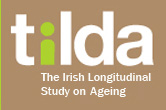Long, Jean (2011) TILDA reports alcohol use and dependence. Drugnet Ireland, Issue 38, Summer 2011, p. 11.
| Preview | Title | Contact |
|---|---|---|
|
PDF (Drugnet Ireland, issue 38)
- Published Version
434kB |
The Irish Longitudinal Study on Ageing (TILDA) is a detailed study of the health, lifestyles and financial situation of 8,000 to 10,000 people as they grow older and as their circumstances change over a 10-year period. The study is being carried out by Trinity College Dublin in collaboration with an inter-disciplinary panel of scientific researchers who have expertise in various fields of ageing. TILDA is funded by the Department of Health, Irish Life and Atlantic Philantropies. The information gathered in TILDA will improve our understanding of the factors that aid successful ageing in Ireland.

The first results from this study have now been published.1 The section on alcohol in chapter 5 of the report includes the following (cross-references removed):
Table 1 Problematic alcohol use and diagnosed substance abuse, by age and sex
|
|
Alcohol problem using CAGE
|
Diagnosed alcohol or other drug misuse
|
|
|
% (95% CI)
|
% (95% CI)
|
|
Male
|
|
|
|
50–64
|
8.6 (7.3–10.2)
|
3.2 (2.4–4.2)
|
|
65–74
|
6.0 (4.5–8.0)
|
3.9 (2.9–5.4)
|
|
>=75
|
2.4 (1.2–4.5)
|
0.7 (0.3–1.8)
|
|
Total
|
7.0 (6.1–8.2)
|
3.0 (2.4–3.7)
|
|
Female
|
|
|
|
50–64
|
4.0 (3.2–5.1)
|
1.0 (0.7–1.6)
|
|
65–74
|
1.5 (0.8–2.8)
|
0.5 (0.2–1.3)
|
|
>=75
|
0.6 (0.2–2.1)
|
0.1 (0.0–0.6)
|
|
Total
|
2.7 (2.2–3.4)
|
0.7 (0.5–1.0)
|
|
All
|
|
|
|
50–64
|
6.3 (5.5–7.2)
|
2.1 (1.6–2.7)
|
|
65–74
|
3.7 (2.8–4.8)
|
2.2 (1.6–3.0)
|
|
>=75
|
1.3 (0.7–2.3)
|
0.3 (0.1–0.8)
|
|
Total
|
4.8 (4.2–5.4)
|
1.8 (1.5–2.2)
|
(Abstracted by Jean Long)
A Substance use and dependence > Prevalence > Substance use behaviour > Alcohol consumption
G Health and disease > Substance use disorder (addiction) > Alcohol use disorder > Alcohol dependence
T Demographic characteristics > Elderly / Older person
G Health and disease > Substance use disorder (addiction) > Alcohol use disorder
Repository Staff Only: item control page